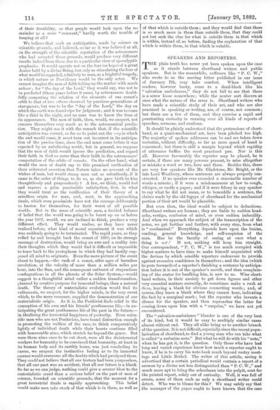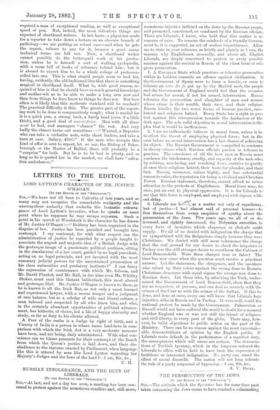SPEAKERS AND REPORTERS.
THE plain truth has never yet been spoken upon the case as it stands between shorthand writers and public speakers. But in the meanwhile, sufferers like "P. C. W.," who wrote to us the moving letter published in our issue of January 7th, may take comfort. When intelligent readers, however hasty, come to a dead-block like his "salvation ambulances," they do not fail to see that there is a screw loose somewhere ; while the acuter sort discern at once what the nature of the error is. Shorthand writers who have made a scientific study of their art, and who are also practised in speaking or writing, are, of course, not common; but there are a few of them, and they exercise a rapid and penetrating curiosity in running over all kinds of reports of speeches, sermons, and orations.
It should be plainly understood that the pretensions of short- hand, as a quasi-mechanical art, have been pitched too high. The majority of spoken addresses can be and are taken down verbatim, without difficulty, so far as mere speed of hand is concerned ; but there is still a margin beyond which rapidity of utterance baffles the most practised pen. Nor is this all. However favourably the reporter may be placed, he is certain, if there are many persons present, to miss altogether or mistake a word or two, here and there. Besides this, there are very few speakers like Mr. Gladstone, Mr. Bright, or the late Lord Westbury, whose sentences are always properly con- structed. If no speaker ever exceeded a reasonable number of words a minute ; if it were a misdemeanour at law to cough, whisper, or rustle a paper; and if it were felony in any speaker to say what he did not mean, or to bemuddle a sentence, the claims made by the old fogeys of shorthand for the mechanical portion of their art would be plausible.
But even then, the ideal would be subject to deductions. Shorthand writers are human ; they are liable to sudden head- ache, vertigo, confusion of mind, or even sudden imbecility. And when we approach the subject of the transcription of the notes, we get further and further, with every step, from what is "mechanical." Everything depends here upon the brains, reading, general knowledge, and self-suspicion of the man. Has he the faculty of seeing at once what a thing is not ? If not, nothing will keep him straight. Our correspondent, P. C. W.," is too much occupied with higher matters to have time to make himself acquainted with the devices by which sensible reporters endeavour to provide against excessive confidence in themselves ; and the idea (which he puts forward) of a reporter's finishing a sentence by anticipa- tion before it is out of the speaker's mouth, and then complain. ing of the orator for baulking him, is new to us. Wise short- hand writers, in their anxiety to get down figures and other very essential matters correctly, do sometimes make a rash at them, leaving a blank for obvious connecting words ; and, of course, they leave a blank where they cannot hear, indicating the fact by a marginal mark ; but the reporter who invents a climax for the speaker, and then reproaches the latter for coming down upon him with a "surprise," we have not yet encountered.
The " salvation-ambulance " blunder is one of the very best of its kind, but it would be easy to multiply similar cases almost without end. They all alike bring us to another branch of the question. It is not difficult, especially since the recent popu- larisation of shorthand,to find a young man who can take what is called" a verbatim note." But what he will do with his "note," when he has got it, is the question. Only those who have hal long and varied experience know how much a reporter ought to know, if he is to carry his note-book much beyond vestry meet- ings and Little Bethel. The writer of this article, seeing it advertised that a certain periodical would contain a report of a sermon by a divine not less distinguished than "P. C. W.," and much more apt to bring the schoolman into the pulpit, sent for the printed report, solely out of curiosity. Well, it was full of errors, some of them each as only a shorthand writer could detect. Who was to blame for this ? We may safely say that the manager of the paper ought to have known that the case required a man of exceptional reading, as well as exceptional speed of pen. But, indeed, the most ridiculous things are expected of shorthand writers. In hot haste, a physician sends for a reporter to take down a lecture on an obscure branch of pathology—we are putting an actual case—and when he gets the report, refuses to pay for it,. because a good many technical terms are left out. Now, a shorthand writer cannot possibly do the better-paid work of his profes- sion, unless he is himself a sort of walking cyclopasdia, with a room full of books of reference behind him ; but it is absurd to expect him to be a whole college of professors rolled into one. This is what stupid people seem to look for, having, evidently, the old-fashioned idea that there is something magical in shorthand itself. What is, with good reason, re- quired of him is that he should have so much general knowledge and mother-wit as to be able to make a long arm now and then from things he does know to things he does not. But how often is it likely that this moderate standard will be reached ? The practical difficulty is this. The greater part of the report- ing work to be done is comparatively rough ; what is needed for it is a quick pen, a strong back, a hardy head (even if a little thick), and a good deal of savoir-faire. Men with all these must be had, and managers "chance" the rest. And very badly the chance turns out sometimes :—" Wanted, a Reporter who can take a verbatim note, write short leaders, and take a turn at case. Salary, 2100." If the man who accepts this kind of offer is sent to report, let us say, the Bishop of Peter- borough or the Master of Balliol, there will probably be a " surprise " for both. But he is to be had in plenty, and so long as he is quoted low in the market, we shall have "salva- tion ambulances."







































 Previous page
Previous page